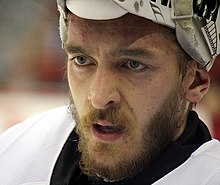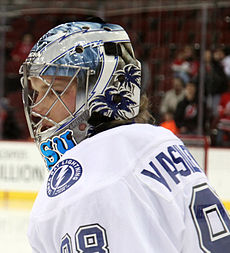It’s not enough to say they are a different breed.
They must be crazy to stay in the way of a piece of rubber traveling in your direction at the speed of light. They can hardly walk on a rubber mat leading to the rink, while they have to maneuver with a blistering accuracy in front of their sanctuary. They are deemed untouchables, but frequently end up with concussions. And yes, sometimes they have fistfights with their opponents. They have to maintain their mental concentration for three hours. The moment they lose it – their team loses. But for them to fail, five other members of their teams must fail first. Still, that’s only a little of consolation. They are the last bastion in the war, and they are ultimately responsible for failure. If the team wins – it’s their victory. But if the team loses, the defeat is also theirs.
How do they manage the pressure of steep rises and devastated defeats?
First, you must be good. Not just good, but glaringly good. They don’t let you in their arenas unless you are carefully preselected. And by a virtue of being chosen, each one of them is already a hero. It’s enough pressure every single game during the season. But the all-year games are only the prelude to the playoffs.
The Playoffs!
Playoffs are a totally different story. There is more intensity, more drama, the rules are different and all the year you fight for an opportunity just to play longer, and that after you finished this grueling season. During the regular season, NHL goalies stop roughly ninety percent of the shots. That’s on average. During the playoffs, they are expected to stop pucks impossible to be stopped under other circumstances.
It’s unimaginable to win The Cup with an average goaltender.
There are four levels of the playoffs, and all you want is to have a chance to play just one more game. In the playoffs, the entire game is elevated. More speed, more body contact, and increasingly more creativity from your opponents. You have to find the puck while having bodies in front of you. You have to be patient. You have to live in the moment, one can’t think of what can happen and specially what has just happened. You have to talk to your defenders. Positioning is crucial. The most effective goaltenders are the ones with minimal movements, not the ones busiest in the crease. You are expected to make spectacular saves and to have your fans wonder “How did he do it?” But you also let improbably easy pucks in and have fans saying “How did it happen?” But that cannot happen too often.
We are now in the third level of the playoffs. The next level will be the pinnacle. The world is watching two goaltenders; one born in Canada and the other one in Russia. Both were thrown into the action accidentally, both were chosen by default after their older and more experienced counterparts got incapacitated. They are both 6’3” – 6’4”. Tranquil and collected in the atmosphere of the playoffs circus. I looked for the interviews with both goaltenders. The Canadian’s is composed and sharp. The Russian’s was conducted in Russian, but for my knowledge of that language it sounded quite interesting and clear. They both sounded like unflappable, composed persons.
Many athletes like to think of themselves as entertainers. When you think of it, they often behave and are treated as such. They certainly are compensated at a very high level. They also often start their fame similarly. The main performer (singer, actor, instrumentalist) doesn’t show up for reason of health, conflicting duties or just contract negotiations. The younger, widely unknown replacement fills in, and the rest is the history.
These two appeared in the playoffs as replacements for their well-established mentors. From the moments of the National Anthem, they were in the center of everybody’s attention. The instant replay in the NHL is very sophisticated and technically quite complex. It has even a central studio in Toronto, where most of the life and death decisions are made. So suddenly, these two goalies had their moves played and replayed over and over again. Talking about the transparency?

Murray in the 2016 Stanley Cup playoffs.
|
|||
| Born | May 25, 1994 (age 21) Thunder Bay, ON, CAN |
||
|---|---|---|---|
| Height | 6 ft 4 in (193 cm) | ||
| Weight | 178 lb (81 kg; 12 st 10 lb) | ||
| Position | Goalie | ||
| Catches | Left | ||
| NHL team | Pittsburgh Penguins | ||
| NHL Draft | 83rd overall, 2012 Pittsburgh Penguins |
||
| Playing career | 2014–present | ||
| Andrei Vasilyevsky | |||
|---|---|---|---|

Vasilevskiy with the Tampa Bay Lightning in December 2014
|
|||
| Born | 25 July 1994 (age 21) Tyumen, RUS |
||
| Height | 6 ft 3 in (191 cm) | ||
| Weight | 204 lb (93 kg; 14 st 8 lb) | ||
| Position | Goaltender | ||
| Catches | Left | ||
| NHL team Former teams |
Tampa Bay Lightning Salavat Yulaev Ufa |
||
| National team | |||
| NHL Draft | 19th overall, 2012 Tampa Bay Lightning |
||
| Playing career | 2010–present | ||
This year’s Stanley Cup semifinals feature two 21-year-old goalies. Both were thrown unexpectedly into the arena and both performed flawlessly. There is no exaggeration that the attention of not only the entire country but much of the world is focused on them. How do they take it? How do they sleep? How do they deal with accolades? And how do they respond to being pulled out of the battle by a coldly calculating team of coaches and managers?
And they are only 21-year-old.
Do you remember what were you doing when you were that old?


